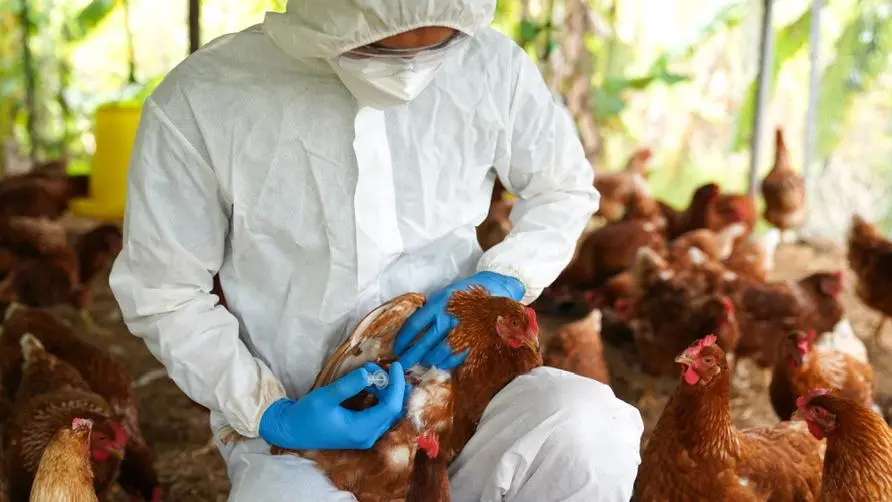Not only causes a wave of egg shortage! Could "bird flu" take over from the new coronavirus and cause a pandemic? Doctors reveal: Human-to-human transmission fatality rate exceeds 50%

Not only causes egg shortage? The fatality rate of human-to-human transmission of avian influenza may exceed 50%
Is the “bird flu” that has recently led to a global egg shortage going to follow the footsteps of the new coronavirus and monkeypox virus and set off another wave of pandemic in the human world? Dr. Huang Xuan, an expert in critical care medicine, warned in the community that avian influenza has begun to spread in the mammal world. For example, minks in Spain, seals in Scotland, sea lions and dolphins in South America have all been found to be infected with “H5N1” avian influenza. Resulting in massive deaths.
Dr. Huang Xuan explained based on statistics from the World Health Organization (WHO) that from 2003 to February 23, 2023, cases of severe illness and death in humans due to avian influenza have indeed continued to exist. According to reports from 21 countries, a total of 868 patients were confirmed to be infected with the H5N1 avian influenza virus. A total of 457 people died from infection with avian influenza, with a mortality rate of about 53%.
“If humans are infected with avian influenza, there is a half chance of death!” Dr. Huang Xuan said that based on past experience, if any virus causes large-scale infections in mammals, there is a certain chance that humans will be infected. For example, recent coronavirus epidemics such as COVID-19, SARS in the past, and the “swine flu” (H1N1 subtype variant) that broke out in 2009, both pandemics are precedents.
At present, major experts around the world are still unable to predict the “jump mode” in which the virus spreads from other organisms to humans, or whether it can further “human-to-human” transmission and cause an epidemic; or even become the next pandemic virus. However, Dr. Huang Xuan still said that based on the past experience of virus jumping patterns, the bird flu epidemic may return with a vengeance.
Has the avian influenza mRNA vaccine already been available? Without antiviral drugs and rapid screening tools, it will still be difficult to fight the epidemic
In fact, in order to prevent the bird flu epidemic, relevant units have already prepared vaccines for prevention? Dr. Huang Xuan explained that the United States already has an avian influenza vaccine based on “attenuated virus” technology, called “AUDENZ”, and it has passed FDA certification. This vaccine is intended to prevent bird flu epidemics and cross-infection in the human world. It will provide 150 million doses of the vaccine within the first six months.
In addition, the University of Pennsylvania in the United States has also developed an mRNA influenza vaccine containing 20 subtypes, including the H5N1 avian influenza virus strain. This study has been published in the well-known international journal “Science” and proves that with current technology, it is indeed possible to quickly produce an effective vaccine against avian influenza viruses through mRNA.
However, with only a bird flu vaccine, epidemic prevention work is still insufficient. Dr. Huang Xuan pointed out that the oral antiviral drugs Paxlovid and Molnupiravir, as well as the oral anti-influenza drug Tamiflu, have certain effects on the prevention and treatment of the epidemic. However, there is still a lack of drugs specifically designed to combat avian influenza viruses and rapid screening and testing tools on the market, which may hinder epidemic prevention efforts and increase the probability of causing a pandemic.
Intensive care doctors urge the public to remember the “5 dos and 6 don’s” principles to avoid bird flu epidemics
Dr. Huang Xuan reminded that poultry farm operators should turn on the insulation and ventilation equipment of poultry houses in a timely manner and implement access control in each farm area. Poultry farm equipment must be thoroughly disinfected, and poultry workers should wear masks, thoroughly disinfect the environment, and wash hands frequently. As for how people can prevent bird flu? Based on information published by Taiwan Centers for Disease Control, Dr. Huang Xuan gave 11 principles of “5 dos and 6 don’ts”:
5 things to do:
Poultry and eggs must be cooked.
Wash hands thoroughly with soap.
If symptoms occur, wear a mask and seek medical attention immediately and inform your occupation and contact history.
People who have long-term contact with poultry should be vaccinated against influenza.
Eat a balanced diet and exercise appropriately.
6 no:
Do not eat raw poultry eggs or products.
Do not smuggle or purchase poultry meat from unknown sources.
Do not touch or feed migratory birds and poultry birds.
Do not release or discard birds in the wild.
Do not mix breeding birds with other livestock.
Do not go to places with poor air circulation or crowded places.
Source:
Avian Influenza Weekly Update Number 884 -WHO
A multivalent nucleoside-modified mRNA vaccine against all known influenza virus subtypes
Further reading:





